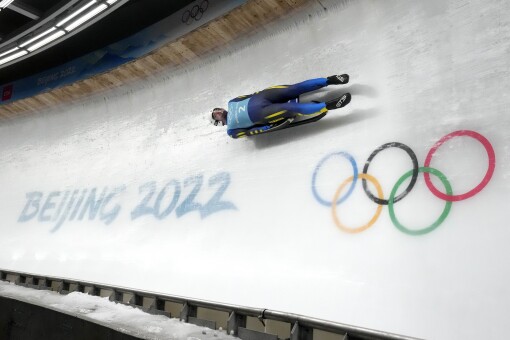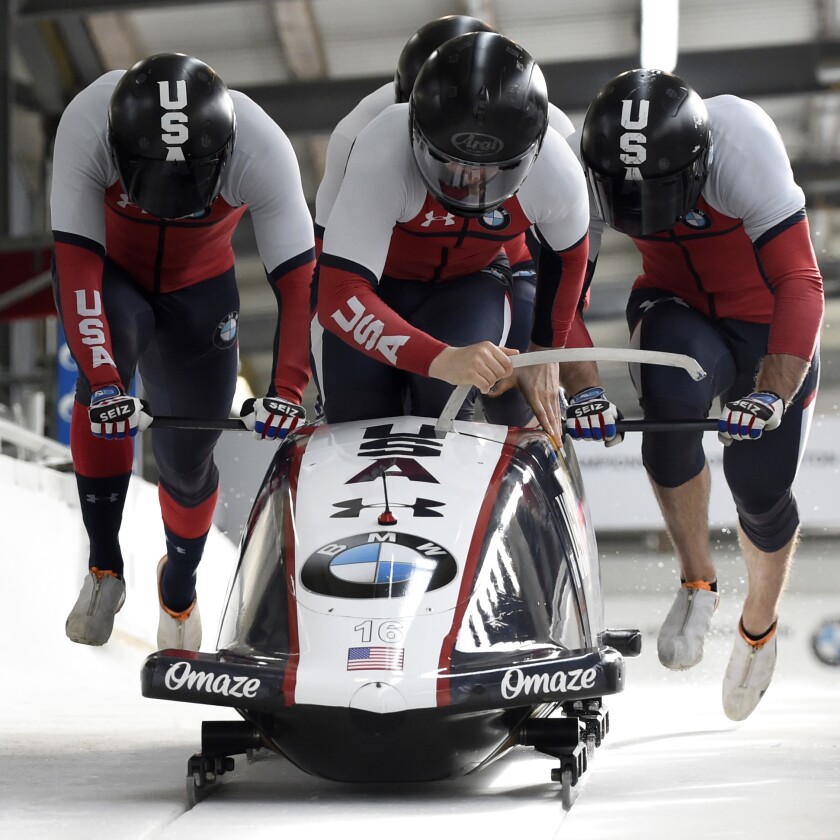How an NBC reality show helped launch bobsledder Josh Williamson’s Olympic career
An Instagram ad changed Josh Williamson’s life.
The Florida native didn’t have high expectations when he clicked on a post about a reality show searching for athletes. He was just a 20-year-old former Division I lacrosse player searching for a challenge.
“Scouting Camp; The Next Olympic Hopeful” was it.
Five years after winning the first season of the televised scouting camp, Williamson made good on the NBC show’s catchy name by making the U.S. bobsled team for the Beijing Olympics. He and fellow bobsledder Sylvia Hoffman, who was a contestant in the second season, are the show’s first Olympic success stories and both will make their Olympic debuts this week.

Beijing Olympics coverage
The four-man event, in which Williamson competes as a brakeman in Hunter Church‘s sled, begins Saturday at the Yanqing National Sliding Center while Hoffman’s two-woman event begins Thursday.
Williamson’s arrival in Beijing was delayed by a positive coronavirus test that left him isolated at the U.S. training center in Chula Vista during the beginning of the Games. Anxiously getting tested every day, Williamson said he couldn’t fully appreciate that he had been named to the Olympic team already because he wasn’t sure when he was going to get there, if ever.
The delayed gratification was another aspect of qualifying for these Games, he said, but his journey to Beijing already had been full of unexpected turns since he clicked on that Instagram post.
“I didn’t know bobsled existed, being from Florida,” said Williamson, who arrived in Beijing on Thursday. “But now here I am, I’m making my first Olympic team. … That’s something I never would have imagined, but that’s what this program brings and what it highlights.”
Before he won the U.S. Olympic Committee scouting camp in 2017, Williamson didn’t even have a passport. Then two days after he impressed U.S. coaches enough to be named one of the show’s eight winners, Williamson was in a Miami passport office applying for expedited documents to get to Canada for national push championships. When he got there, he borrowed ice spikes, gloves and a helmet from athletes trying out for the 2018 Olympics and was pleased to not finish last.

Hunter Church, Josh Williamson, James Reed and Kris Horn compete at the 2020 bobsled world championships.
(Jens Meyer / Associated Press)
Five years later, Williamson is challenging for much more than not being “dead last.” He has two World Cup podium finishes, including a third-place result in January in Winterberg, Germany.
The Olympics were never on Williamson’s radar growing up. Since he started playing lacrosse in middle school, Williamson’s goal always was to be a Division I lacrosse player. He achieved it by earning a spot at Mercer, a Division I school in Georgia that competes in the Southern Conference, but injuries left him dissatisfied with the reality of his childhood dream. Of his once-lofty goal, he wondered to himself, “Is this it?”
After not playing as a freshman, Williamson transferred to Florida State as a student. He enjoyed being closer to home, near friends and family, and the lower in-state tuition, but wanted to compete again. Searching for anything that would tie him to a life as a competitive athlete, Williamson continued lifting weights and running sprints as he shopped around for sports that suited his speed, strength and size.
Bobsled was it.
At 6 feet 1 and more than 200 pounds, Williamson, who played football prior to lacrosse, found physical similarities between himself and professional bobsledders. He followed them on Instagram to check on their workouts and thought, if he trained enough, he could match their combine numbers.
Then the “Next Olympic Hopeful” ad popped up on his feed.
The show is designed to find talented prospects in niche Olympic sports. With the backing of the USOPC, finalists are invited to a tryout at the Olympic training facility in Colorado Springs, where they go through drills like vertical jumps, squats and pull-ups and sport-specific tests to evaluate how well they fit into disciplines like bobsled, skeleton or rugby sevens.
Many hopefuls, like Williamson, were former athletes looking for their next competitive outlet.

Hunter Church, Josh Williamson, James Reed and Kris Horn push the sled at the start of a heat during the 2020 bobsled world championships in Germany.
(Jens Meyer / Associated Press)
“Bobsled, we’re full of people who were football players who were really good but maybe for injury or whatever reason weren’t quite good enough to go to the NFL. Or track athletes who were quick but they weren’t 100-meter-finals fast,” Williamson said. “That’s what that program was all about: to highlight the talent transfer aspect of some Olympic and paralympic sports.”
Of the eight men on the U.S. bobsled team, seven played other sports in college. Frank Del Duca (Maine), Carlo Valdes (UCLA), Jimmy Reed (Maine) and Kris Horn (Massachusetts Amherst) did track and field. Hakeem Abdul-Saboor (Virginia) and Charlie Volker (Princeton) once held NFL aspirations.
Hoffman, who wasn’t named a winner during the second season of the “Next Olympic Hopeful” but impressed bobsled coaches enough in 2018 to earn a special invite to additional training camps, played basketball at Louisiana State Shreveport from 2009-11 and participated on the school’s club weightlifting team.
“It’s pretty difficult coming into a different sport,” Hoffman, 32, said in a video conference, “especially after not doing any sprinting after the last eight years, but I set plans and goals for myself, some milestones for me to achieve and surpass. And each year, I’ve been able to just work my butt off and really just achieve those things.”
Winning “Next Olympic Hopeful” allowed Williamson to jump start his rookie season with push championships in Calgary followed by an Olympic test event in Pyeongchang. Tasked with helping Olympic-bound pilots study the new track, Williamson arrived at his first Olympic venue as a bright-eyed hopeful.
Four years later, he showed up in Beijing as an Olympian.
For all the latest Sports News Click Here
For the latest news and updates, follow us on Google News.
